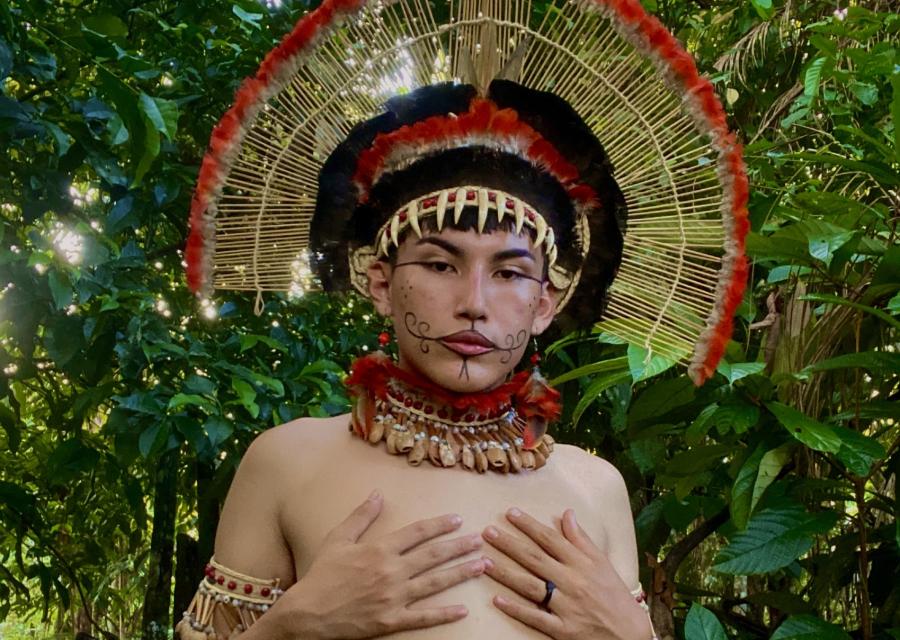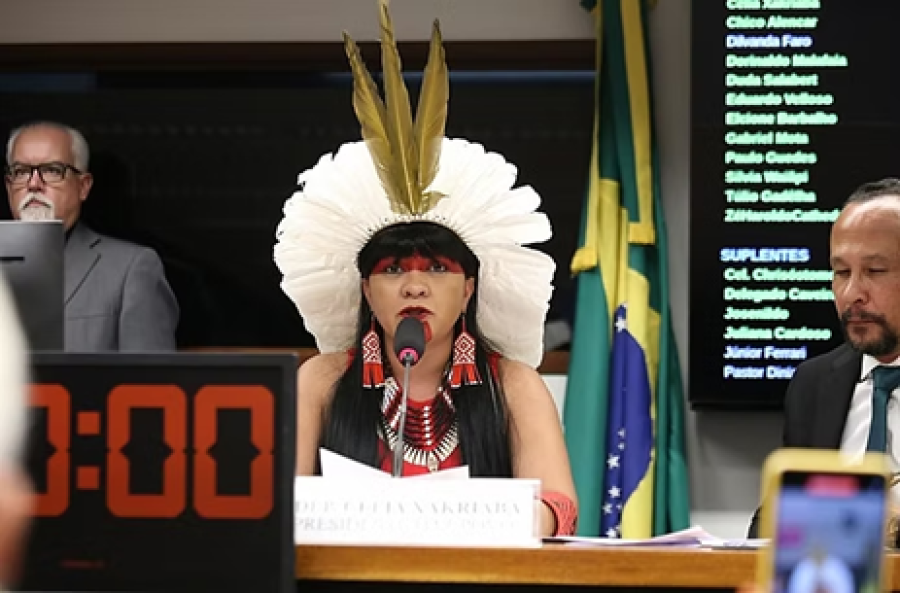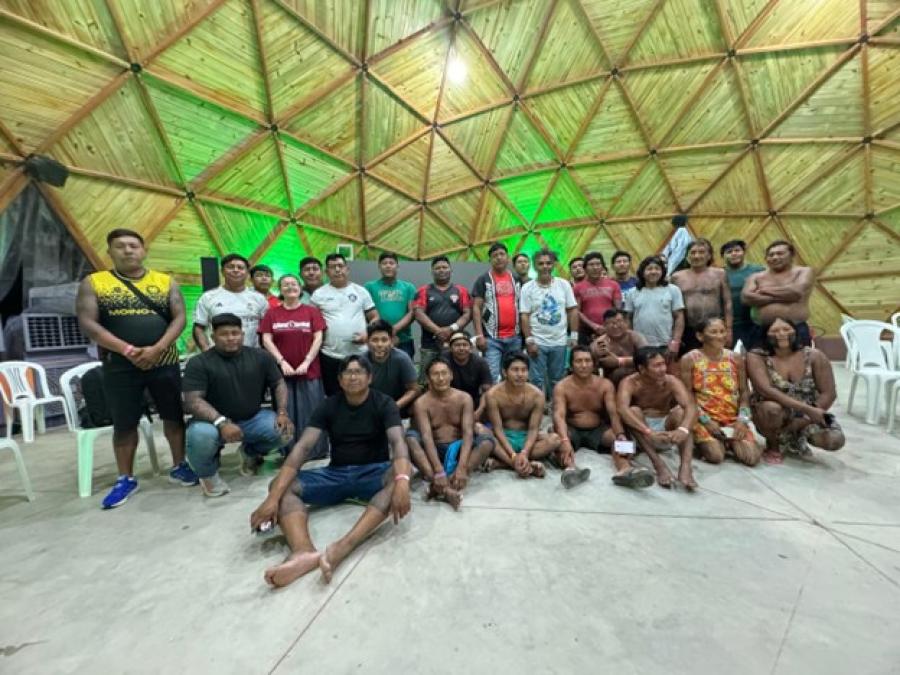
By Tia-Alexi Roberts (Narragansett, CS Staff)
From campaigns for equal rights to impactful cultural landmarks, the 2SLGBTQ+ movement constitutes advocacy for parity, diversity, and the affirmation of unique identity. Two-Spirit individuals, who embody both masculine and feminine qualities within Indigenous cultures, often face adversity and marginalization from misconceptions and assumptions about gender roles, misunderstandings of terminology, inadequate legal protections, lack of representation in media,and biases in healthcare settings.
Same-sex marriage was legalized in Brazil in 2013, and same-sex couple adoption has been permitted since 2010—both significant recent advancements in 2SLGBTQ+ rights. Anti-Discrimination Protections were secured in 2019 preventing discrimination in other contexts such as the workplace, school, public and private sectors. Despite such progress, 2SLGBTQ+ individuals continue to face social violence and discrimination due to their identities. Yet, they remain resolute in their pursuit of equality.
Cultural Survival recently spoke with Kuenan Tikuna, a Trans Indigenous woman affiliated with the Tikuna and Tariano Peoples from the Amazon region of Brazil. She developed her gender, cultural, and artistic identity surrounded by formidable warrior women including her mother, Metana, a celebrated leader of the Tikuna people and a lesbian, and other key figures. When Tikuna was 15, she visited the city for the first time and experienced culture shock, being exposed to the influence of colonization on Indigenous and 2SLGBTQ+ individuals. From this experience, she was inspired to strategize and create tools to combat assimilation, to strengthen the voice of her people, and to claim positions of power and visibility by blending her ancestral knowledge with the present and future.
Cultural Survival: How important is the Two-Spirit identity within your Indigenous community?
Kuenan Tikuna: The importance of Two-Spirit individuals, or Pu’tchi, as they are known in the Tikuna language, goes back to sacred cosmologies, where Ngutapa (the Creator), portrayed as a being without genitalia, gives birth to his children through the knee at the beginning of it all, originating the first Tikuna beings in the Tikuna worldview. Currently, communities play a crucial role in decolonizing bodies that have been historically subjugated, sexualized, and stigmatized.
Two-Spirit individuals are respected in their communities for challenging the stereotypes and social norms imposed on their bodies by non-Indigenous society, redefining pre-established concepts of femininity and masculinity. By expressing their cultural and gender identity in an integrated way, they promote a unified representation. However, this recognition was achieved after facing adversity, including persecution and unjust deaths of many individuals. Some resisted, while others delighted in Eware, our sacred home. These reports question not only the roles and powers exercised by individuals on the physical plane, but also on the spiritual level.
CS: How does the term ‘Two-Spirit’ reflect a cultural understanding of gender and sexuality that is different from western norms?
KT: For me, Two-Spirit is not just seen as a term, but proof of existence and resistance to centuries of erasure. Unlike what colonization and Christianity constructed of our image, we are not a result of colonization. We were here long before the invasion. We do not need to represent the colonial imagery of gender and sexuality that limits our existence, that makes us sick and murders us. Our ethnic identity goes hand in hand with our gender identity and sexuality.
Kuenan Tikuna (Tariano, Tikuna) Photo by: Jarê Apinajé
CS: How can some of the common misconceptions about Two-Spirit identity be addressed?
KT: We can mention the lack of spaces to welcome and debate from our Indigenous perspective, often generating a lack of information about our bodies. And this can be addressed and debated through public policies for us, Indigenous people.
CS: How does the celebration of LGBTQ+ Pride month intersect with the recognition of Two-Spirit identities?
KT: Recognition arises from the non-Indigenous LGBTQ+ community itself as a way of replacing and honoring our ancestries, recognizing our fundamental significance in building this society.
CS: What historical roles have Two-Spirit individuals played in Indigenous communities and how has this role evolved over time?
KT: In addition to the political role [I mentioned], the Two-Spirits incorporate into their lineage the ancestral knowledge of the sacred art of the Tikuna People, becoming fundamental elements for the harmony of our culture and artistic production, which ranges from works of art to leadership of cultural events of great importance.
CS: What are some challenges faced by Two-Spirit individuals today, both within and outside Indigenous communities?
KT: Currently, one of the main challenges for the Two-Spirits is the invasion of Christian religions in communities affecting aspects that are deeply sacred to us. These religions tend to demonize our bodies and cultures, resulting in alienation and identity conflicts and thus generating [what] I classify as genocide because it leads young people to use drugs and drink, and ultimately suicide.
Fleeing from this, many young people leave their community in search of a better future, but when the bubble bursts and they realize the system they live in in the city—the violence mixed with prejudice and the lack of public services such as education, health, housing, and worthy food—these individuals end up becoming frustrated and going down the path of suicide, as if it were a strategy of the rulers for our genocide.
CS: How can non-Indigenous LGBTQ+ individuals and allies better support Two-Spirit communities?
KT: By considering our own privileges and using them to expand our representation in environments, it is possible to raise awareness and support our initiatives.
CS: In what ways are Two-Spirit identities represented in contemporary arts, literature, and media?
KT: We don't want to be represented; we want to speak for ourselves. But I see from a non-Indigenous perspective a lot of sexualization and romanticization of our bodies. On the other hand, Indigenous artists show our reality through their expressions that deeply engages the viewer, giving them the inclination to reflect their identity [engage] the viewer and make them sensitive and reflect on their identity, and that is what I do.
Top photo: Kuenan Tikuna (Tariano, Tikuna). Photo by: Jarê Apinajé



